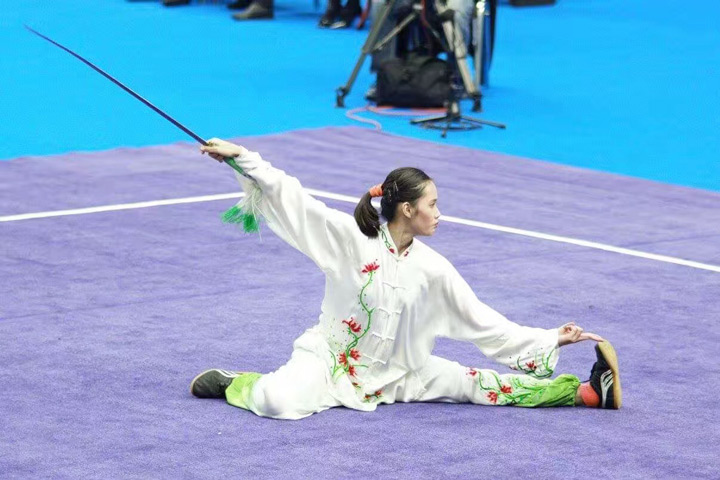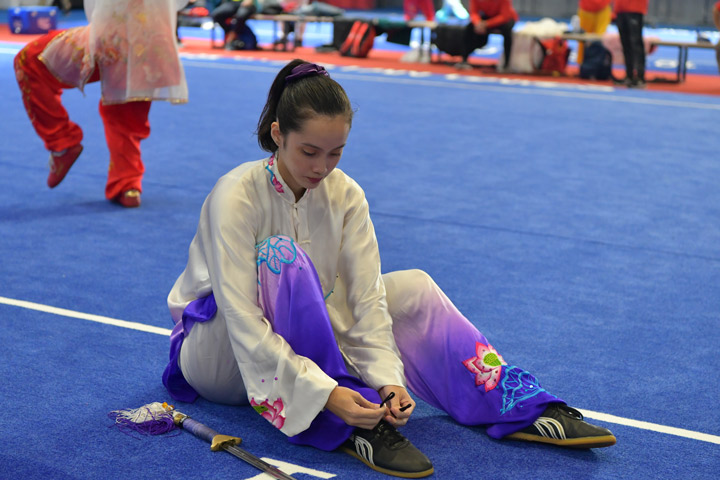The three-time SEA Games gold medalist and Lexus Ambassador shares her sports journey, and what she has gained from being a highly skilled practitioner of this demanding Chinese martial art.
READ ALSO: Putting In The Work: Wendy Puyat On How A Lifetime Of Sports Helped Ensure Her Love Of Fitness
Agatha Wong has delivered stunning performances worthy of gold medals at the SEA Games—once in 2017, and twice in 2019. Her discipline and dedication to this demanding martial art are on full display whenever she takes center stage to compete. Spectators are often left breathless and in awe of her martial arts prowess.

For those who aren’t familiar with Wushu, Wong is more than happy to share her firsthand knowledge about its finer details and intricacies. Who better to learn this Chinese martial art from than a three-time gold medalist?
Sport and performance
There are two main categories that fall under Wushu, Taolu (performance-based) and Sanda (sparring). Agatha belongs to the former and, under that, there are three main disciplines one can compete in: Changquan, Nanquan, and Taijiquan. Changquan is the first discipline everybody learns when starting in Wushu.
“It’s like the default before anyone transitions to the other two disciplines: Nanquan and Taijiquan,” the 21-year-old explains.

When deciding which discipline is best for an athlete, the coach evaluates Changquan first. Usually, a practitioner is transferred to Nanquan if they display strong muscular power and physical definition while some are placed under Taijiquan because they usually display good flexibility and soft movements. An athlete can also stay in the Changquan category if the coach sees if the athlete is fit to compete.
All three disciplines have the following: Changquan for either Straight Sword (Jian) or Spear (Qiang), Straight Sword or Cudgel (Gun), Broadsword (Dao), Spear and Broadsword or Cudgel or simply one weapon at a time. But usually, Straight Sword and Spear or Broadsword and Cudgel are the main pairs coaches give to athletes.
“For me, I use a straight sword hence, the events I compete in are Taijiquan (bare hands) and Taijijian (straight sword),” Wong says.
Clearing the mind
Wong began her Wushu journey when she was 12 years old. While she also did ballet, swimming, and Karate, there was a certain attraction to Wushu that kept making her come back to it.
“I couldn’t pinpoint what kept me going to the gym for training, even though it was really hard,” she says. One year later, she turned professional and began training even more extensively. Now 22 years old with three gold medals under her belt, she still pushes herself to achieve even more.
“There are many mental and physical benefits to practicing Wushu,” she says. Discipline, patience, perseverance, mental preparedness, and the ability to adapt to difficult, or stressful situations are traits Wushu augments. The physical benefits alone are noteworthy as well.
“When I started developing the necessary muscle groups needed for Wushu, I just felt so strong,” she explains. “I don’t look very muscular, but what Wushu develops is the endurance and the power hidden in those muscles.”
Sense of self
She is confident she can excel in any sport without fear of getting injured: “When you dedicate time developing your strength in Wushu, you will feel like you can do anything.” At the same instance, her sense of self was also forged during her career as an athlete.
“I learned to be more self-aware of other people around me,” Wong recounts. “I learned patience and most importantly, discipline in everything I do—be it training, my education, and other commitments. I owe all that to Wushu.”
Agatha muses that in Wushu, there is no such thing as perfection, although every Wushu athlete strives to reach whatever there is that can come close to perfection. “You can learn so many Wushu forms,” she explains. “It’s lifelong learning and it never stops. I think that’s what really keeps me passionate about the sport. It pushes me to learn every day, and I never get tired of it.”
It comes as no surprise Lexus forged a partnership with her as brand ambassador in 2020. Agatha shares the same values, work ethic, and passion as Lexus’s Takumi master craftsmen. The desire to constantly improve oneself and the immense dedication required are the ingredients of a poignant kinship between the Japanese luxury brand and the young Filipina athlete.
Role model
It has long been her dream to see the sport flourish here in the Philippines and throughout the world. She wants kids to beg their parents to let them do Wushu, and she wants parents to consider letting their children do Wushu at an early age instead of the usual sports.
“I want Wushu to be seen by everyone as something beautiful, something difficult, something amazing, and something which requires a great deal of bravery to do,” she says.
In fact, Kung Fu stars Jackie Chan and Jet Li are practitioners of Wushu and Taolu. Agatha has already been asked if she would consider a career as an action actress who does her own stunts.
“I don’t think I see myself delving into that industry just yet, but kudos to all the people part of it!” she laughs. “But I would most probably do it if it was a major role, though I’m not really going to pursue acting full time!”
Well worth it
When asked how it felt to stand on the podium after years of dedication, training, and sacrifice her response is as expected of any athlete competing at her level, that of knowing the worth of all the sacrifices.
“In the end, you will realize that everything you have done leading up to a single moment of success—everything you regretted not doing, not experiencing, or missed out on—all of that just fades away and you will think to yourself this is why I chose this life instead of everything else,” she explains. “When I found out I had won the gold medal, the tears just couldn’t stop flowing. I finally fulfilled my responsibility as a Philippine athlete, and it was worth it.”

At Lexus, Takumi craftsmanship is an example of how the brand is driven by a deep philosophical view of excellence. For Agatha, applying that same strive-to-be-the-best mindset has already resulted in amazing experiences. You can be certain that this paragon of Wushu artistry will keep delivering awe-inspiring performances in the years to come.





